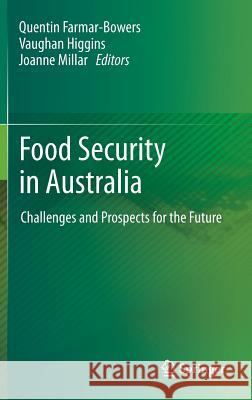Food Security in Australia: Challenges and Prospects for the Future » książka
Food Security in Australia: Challenges and Prospects for the Future
ISBN-13: 9781461444831 / Angielski / Twarda / 2012 / 476 str.
Food Security in Australia: Challenges and Prospects for the Future
ISBN-13: 9781461444831 / Angielski / Twarda / 2012 / 476 str.
(netto: 576,41 VAT: 5%)
Najniższa cena z 30 dni: 578,30
ok. 16-18 dni roboczych.
Darmowa dostawa!
This book considers the ability and capacity of the food supply system in Australia to provide food security for the ever-increasing domestic and international population in the face of growing challenges in production, resource supply and failures within the food system itself. Although Australia is a net food exporting country, domestic food insecurity exists and will increase as food prices rise in the coming decades. An overview of the food supply system highlights the main challenges that are determining the future. Many of these challenges can be resolved by the Australian government, but others are in the hands of global governance to which Australia can only adapt. This book sheds light on the challenges and discusses the prospects for developing more sustainable and resilient future food systems in Australia. In addition, it covers food security and sovereignty issues under the heading of "food equity and access," "food production, policy and trade," and "impacts of land use planning on agriculture." The unique features of the book include the following: - Most literature on food security pertains to developing countries. By way of contrast, this book explores food security in a developed nation (Australia) that seemingly should not have food security issues. The topics covered in the book are relevant to other developed nations with growing populations and resource management challenges. - The book chapters are written by specialists to paint a comprehensive picture of the political, social, economic and environmental issues that give rise to food insecurity, and the challenges these issues present to the security of the food system in coming decades. The overall organization of the book uses a theoretically informed and multi-disciplinary approach. This enables a critical and in-depth analysis of food security by outlining the key challenges as well as prospects for the development of more sustainable and resilient agri-food systems. - The three principal topics in the book are dealt with by a multi-disciplinary team of authors in a way that teases out diverse points of view illustrating the complexity of food security. Author disciplines include health and nutrition, agriculture, ethics, social science, law, and practitioners managing food aid programs. - The book shows how food security relates to many technical, social and moral issues in society and how it is possible to develop successful programs to improve food security.











